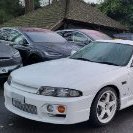Disc Rotors
Announcements
-
Similar Content
-
Latest Posts
-
By svenskalice · Posted
Yeah that's true, but idk. Only a 6 month lifespan seems a little short. Oh also, is there a preferred way to send images? Like any sites? I'm used to just being able to upload them lol -
By TurboTapin · Posted
Hey, like MBS206 mentioned; I dropped off my short block and rotating assembly Monday. With a quick verification, he believes he can clear it up with just a hone and new rings but he will confirm once the rotating assembly is out. If I were you, I would either go stroker or just replace the block if it does need to be bored over to next size. Block is cheaper then forged pistons. -
By drifter17a · Posted
live in the UK, and London has introduced a Low Emission Zone (LEZ) that requires individuals to pay £13 if their car doesn’t meet the required emissions standards. The standard specifies that NOx emissions must be less than 0.08 g/km (i.e., the vehicle must meet Euro 4 standards or better, which generally results in NOx levels of around 0.08 grams per kilometer). I reached out to Nissan UK, and they advised me to contact Nissan Japan directly. Does anyone have contact details for Nissan Japan or any certifications of conformity that show the emission details or NOx levels for the RB25DET engine? Any guidance would be greatly appreciated. -
these guys recommended to me and supplied custom 4 inch mufflers, couldn't be happier. They will spec a muffler to your preferred level of sound and know RB's well. https://spmufflers.com.au/
-
Yeah this used to happen to me every year and a quick call would at least raise the agreed value back up / reduce the premium, but usually both. That said for the first time on the renewal this year our agreed values went up or stayed the same over the fleet and the premium came down so that was a nice surprise.
-







Recommended Posts
Create an account or sign in to comment
You need to be a member in order to leave a comment
Create an account
Sign up for a new account in our community. It's easy!
Register a new accountSign in
Already have an account? Sign in here.
Sign In Now